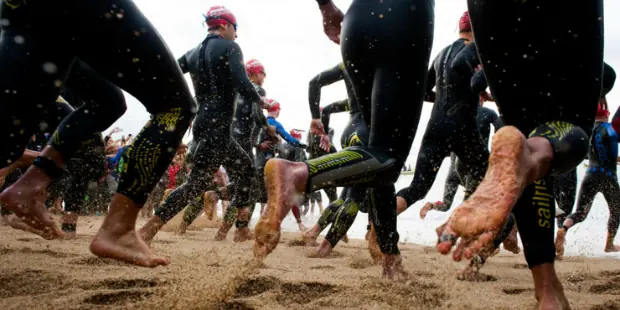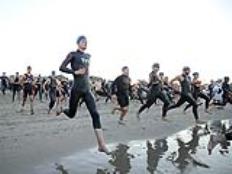
by Lisa Dolbear
The decision to take on an IRONMAN race shouldn't be made lightly. No matter what shape you're in as an athlete, going after the full deal will require commitment, training, and preparation. While everyone's starting point differs based on athletic ability and multisport experience, there's one part of the process we all face equally: the question of whether or not we're ready to step up to 140.6 miles.
There's no one size fits all way to evaluate a person's readiness to swim 2.4 miles, bike 112 miles and run 26.2 miles, but the following signs are good indications that you're IRONMAN-ready.
You've mastered time management.
Do calendars and schedules make you feel warm and fuzzy? Good. Training for IRONMAN means making time for workouts nearly every day of the week. It might seem like a contradiction that a person with a busy schedule is "ready" for an undertaking like IRONMAN, but if you're used to moving quickly from one engagement to the next and able to reorganize your time on the fly as things change or shift, you've mastered an essential skill for IRONMAN success.
More: A Balanced Guide to Holiday Nutrition
"While training for my first IRONMAN, I scheduled my training session in my Outlook calendar right next to meetings and other work appointments," notes 34-year-old Matt Reese. "Training 12-20 hours per week might not seem like a huge commitment, but you also have to add on the time it takes to get to and from sessions, prepping for workouts and cleaning up afterwards," cautions the Atlanta, GA native.
As a two-time IRONMAN, Reese also values the ability to be proactive with his time, thanks to keeping a schedule. "It's easy to start seeing where one- or two-hour windows open up, and time management just starts to become second nature."
You're comfortable saying "no".
Can you handle the peer pressure of bailing on friends? We all know that person who knows exactly what to say in order to woo us away from responsibilities, but being successful at IRONMAN means making decisions that protect the body and the ability to stay focused. Staying out late the night before a long or strenuous workout means putting the body at risk for injury or overtraining. Skipping workouts to do something more fun means losing opportunities to develop the strength and fitness needed for IRONMAN.
"I was invited to a wedding that fell on my heaviest training weekend," recalls 30-year-old triathlete Susan Cosgrove. "I kept trying to make it work in my head, but no matter how I planned out the timing there was no way I could do both things."
The Philadelphia, PA native finally resigned to miss the wedding, and opted instead for a family vacation that was more training-friendly. "My fianc? reminded me that training was my priority. Spending the night drinking and dancing on tired legs the day before an 18-mile run was not going to work. Having his support was hugely helpful. He never made me feel guilty about anything and supported me 100 percent."
You have a support system.
The saying "behind every great man is a great woman," may or may not be true, but behind every great IRONMAN is definitely a great support system. Training 17-20 hours a week means there's a greater risk to fall short in other areas of life from time to time. We will rely on friends and family to not only help shoulder responsibilities during moments when it's physically impossible for us to do it all on our own, but to offer support and encouragement when it's mentally impossible to stay motivated in our training. Whether you rely on one or two close friends or a huge extended family, it's important to know you have people who have your back both on and off the IRONMAN course.
You can handle setbacks.
The lead-up time to an IRONMAN race can be anywhere from six months to a full year and more, depending on the athlete's fitness level going in. That's a lot of time and it will not pass without incident--from missed workouts, unexpected injuries and debilitating illnesses, to flat tires, unexpected weather and nutrition failures.
The best athletes know how to take these experiences in stride, and catalog them for future reference. If something similar goes wrong down the road (pun intended), they know what to do for the best possible outcome. From an emotional perspective, it's important to realize that failure one day does not mean failure overall. Setbacks are a part of training and race day--if you can see the silver linings, you'll go far in this sport.
You listen to your little voice.
Understanding your training plan is only half of the equation when it comes to IRONMAN--the other half is understanding yourself. Being a successful endurance athlete means knowing your body both physically and mentally. It's about analyzing your heart rate, breathing, form and cadence, but also about articulating your emotions, energy and mood.
We've all heard the little voice in our head--the one that negotiates with us when we're not sure what to do. Or the one that kicks in and provides commentary when it's inappropriate to say things out loud. The key is to not just hear that voice, but to listen and really understand what it's sharing, and then convert those messages into something positive to push you forward.
"For years I would suffer from negative self-talk," explains 50-year-old Karen Gorman Clemens. "Training for my first IRONMAN, I was 165 pounds and I didn't lose any weight, but I know I gained more muscle. I realized as I was getting stronger and my confidence was building, that my appearance didn't matter," the New Hampton, IA native said. "I started thinking, I'm a 50-year-old bad ass!"
If you fall into the above categories, it might be your ideal year to sign up for an IRONMAN race.
Lisa Dolbear is a three-time IRONMAN, triathlon coach, marketing professional, and mother of two.
Recent Articles:
- 7 Reasons To Do An IRONMAN In 2016
- 2015 Triathlon Running Shoe Guide
- Indy 500 Winner Tony Kanaan on Triathlon, Training and Driving
Connect with us on Twitter, Facebook, Instagram or Pinterest for more tips, recipes and ideas to fuel your ACTIVE life.
About the Author









Discuss This Article